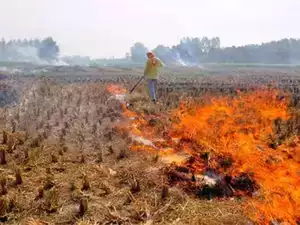Punjab’s Action Plan to Curb Paddy Straw Burning
The Commission for Air Quality Management has announced Punjab’s ambitious plan to reduce farm fires by 50% during the upcoming winter season. Moreover, the state is determined to completely eradicate stubble burning in six districts.
A Vast Expanse of Paddy Cultivation
Punjab’s action plan to combat paddy straw burning reveals that approximately 31 lakh hectares of land in the state are dedicated to paddy cultivation. This extensive cultivation is anticipated to yield around 16 million tonnes of paddy straw (non-basmati). The state plans to manage this straw through two primary methods: in-situ, which involves incorporating crop residue into fields, and ex-situ, where stubble is used as fuel.
Utilizing Straw for Industrial and Energy Projects
Efforts are underway to harness the potential of paddy straw for industrial and energy generation projects. A significant quantity of straw will also be repurposed as cattle fodder, offering a sustainable solution.
Pusa Bio Decomposer: A Key Solution
Punjab intends to manage approximately 8,000 acres of paddy fields using the innovative Pusa Bio Decomposer. This microbial solution has the remarkable capability to break down paddy straw within a mere 15-20 days. Farmers will have access to this solution at no cost, facilitating responsible straw disposal.
Targeted District Elimination
The State Action Plan goes a step further by aiming to eliminate stubble burning in six districts: Hoshiarpur, Malerkotla, Pathankot, Rupnagar, SAS Nagar (Mohali), and SBS Nagar. The plan aspires to achieve at least a 50% reduction in fire counts in Punjab compared to the previous year.
Districts Leading the Way
Government data indicates that five districts, namely Sangrur, Bathinda, Firozpur, Muktasar, and Moga, accounted for approximately 44% of the total fire counts in the state last year. These areas are likely to witness significant improvements in fire reduction efforts.
Month: Current Affairs - September, 2023
Category: India Nation & States Current Affairs






